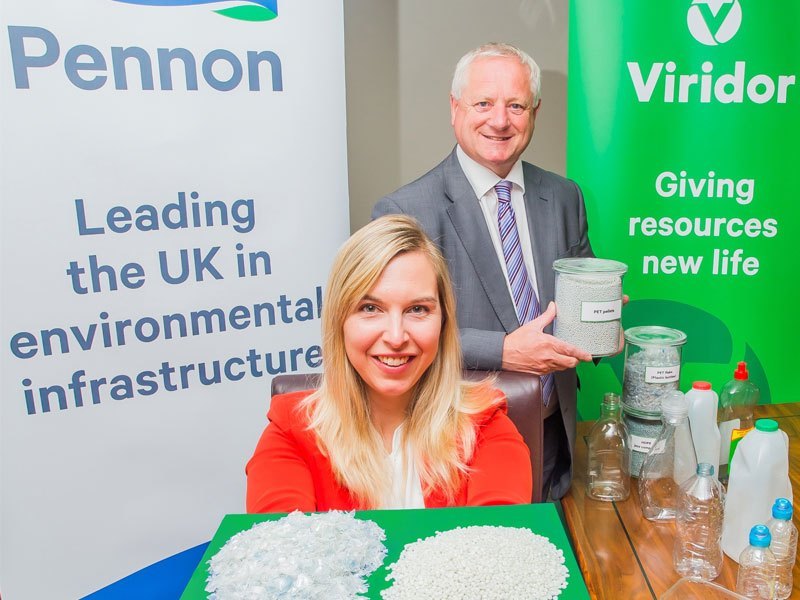Viridor, the biggest UK-owned recycling company, has announced that all its recyclable plastic waste will be reprocessed in the UK from next year as part of the company’s recycling investment programme.
The announcement follows the results of its 2019 Recycling Index, which shows that 87% of Cardiff residents say the UK should deal with its own plastic waste rather than exporting it.
Viridor’s Energy Recovery Facility (ERF) in Cardiff is the largest ERF in Wales treating waste from the local authority and local business contracts. The facility, which has been operational since 2014, handles 350,000 tonnes of residual waste (non-recyclable) waste, per year. It diverts at least 95% of South Wales’ residual waste away from landfill and generates 250GWh of electricity for the National Grid. That is enough to power around 68,448 households.
With the successful commissioning of its new £65m plastics reprocessing plant at Avonmouth, near Bristol, in 2020 – the UK’s biggest multi-polymer facility – Viridor will create new raw materials, ready to be reused by packaging manufacturers in flake and pellet form from all its core recyclable materials collected in the UK.
Viridor Managing Director Phil Piddington said that, crucially, this demonstrated that plastic need not be considered a single use item, with reprocessing allowing it to be put back into the economy in a process which uses 50% less energy than virgin plastic.
Sustainability charity WRAP identifies these core plastics as HDPE (plastic bottles, including milk bottles, shampoo bottles and other household items, such as cleaning products), PET (fizzy drink and water bottles) and PP (pots, tubs and trays).
The UK Plastics Pact, of which Viridor was a founding member, has made the removal of unrecyclable plastics a key focus over the coming year. It says that as far as possible, by the end of this year, Pact members should remove polystyrene and PVC from food packaging and, by the end of 2020, they should be eradicated from non-food products.
Viridor has responded to a call from the UK public, revealed in its 2019 Recycling Index, in a new development which has been made possible through innovation and a programme of recycling and reprocessing investment.
Viridor’s 2019 Recycling Index reveals that 85% believe the UK should recycle and reprocess plastic waste at home. This statistic has risen by five points since Viridor’s 2018 index. The index, now in its fourth year, tracks public behaviour to recycling.
Mr Piddington, who is also Chairman of the trade body the Environmental Services Association, said:
“Viridor has been using the Recycling Index to track public attitudes to recycling for four years and, as a UK company working with 150 local authority and major corporate clients and 32,000 customers, we understand the appetite for greater resource efficiency and a more circular economy.
“What this really means is that people expect the UK to be responsible for the waste it produces. The public want us to find a way to recycle and reprocess plastic so it is no longer considered single use, that it will go on to live another life and make an ongoing contribution to our economy.
“Viridor, through the Plastics Pact, is working hard with like-minded companies who can help us achieve our goal of making it easy for people to do the right thing when they separate their recycling at home. We are accomplishing this through our dedicated division, Viridor Resource Management (VRM). The public should feel confident that when they put the Right Stuff in the Right Bin, we ensure that it can be recycled and reprocessed by investing in UK infrastructure.”
Sarah Heald, Director of Corporate Affairs and Investor Relations at Viridor’s parent company, the FTSE 250 Pennon Group, said the investment commitment would help to address the reprocessing capacity gap which had led to plastic waste being exported. In addition, policy changes including the 2022 plastic tax, which will require packaging to contain at least 30% recyclable material, were creating the demand for recyclable material in the UK – another factor which had contributed to plastic being exported.
She said it was an exciting time to be in the recycling industry, a time when programmes, such as David Attenborough’s ‘Blue Planet’, had captured the imagination of the public with this greater awareness about recycling being developed in line with changes in government policy.
Ms Heald said:
“The plastics tax and the Resources and Waste Strategy’s focus on issues such as Extended Producer Responsibility, or producer pays, will have a really significant impact because they help to create the right environment for investment in the infrastructure the UK needs and, of course, the demand for recyclable material in the UK. It is crucial that UK manufacturers and consumers brands want to use recyclable material in new products, that this is part of their own sustainability targets because that is the circular economy in action and that should be everyone’s ambition.”
Earlier this year, the company announced the £65m investment in a plastic reprocessing plant at its Avonmouth Resource Recovery Centre. The new plant will be located next to the £252m energy recovery facility (ERF) under construction at Avonmouth, which allows it to draw on heat and electricity created by the ERF. This co-location means that waste which cannot be recycled will be put to work to power a plant which puts more recyclable material back into the UK economy, contributing to both resource and energy efficiency.
Viridor also has specialist plastics recycling and reprocessing facilities at Rochester in Kent and Skelmersdale in Lancashire and a network of materials recycling facilities across the UK.
